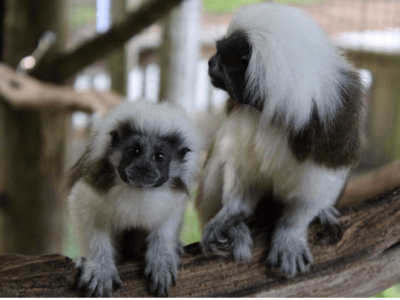Central Florida Zoo, Animal Department Internship- Sanford, Florida
Remember when your parents took you to the zoo as a little kid? Maybe you thought, “Wow! I want to work with giraffes!” You can now get up close and personal with your favorite animals and become more employable at the same time. The Central Florida Zoo offers internships in eight different animal departments. Your office? The luscious outdoors. Your colleagues? Over 500 animals on display. Your job? Give those animals the home they deserve and fall in love while doing it.
What it’s actually like
You better love the Florida sun because you practically live outside. “We remind candidates that time outdoors is expected, in all different weather conditions including heat, humidity, and rain. Caring for animals is hard work and involves considerable physical exertion,” Senior Animal Care Specialist Tarah Carpenter said. But you only have to give up two days a week—the ideal schedule for people who like to get everything done at once. Madison Cole completed her internship this summer. “[Zookeeping] isn’t about playing with the animals. It’s about taking care of them, so one must be prepared to be doing a lot of cleaning.” But in the end, Cole stresses the work is worth the demands of the job.
Cool stuff you get to do
“In addition to assisting with cleaning, animal care interns have the opportunity to be involved with public presentations, diet preparation, animal feeding and special projects, including the creation of enrichment items and participation in research programs,” Director of Education in Internship Coordinator Stephanie Williams said. Can you imagine being so close to a spider monkey that you die from cuteness? Or becoming buddies with a brown lemur? “The highlight of my internship was making an enrichment ball for the animals, and the Kinkajou made the ball into a bed,” Cole said. Animal lovers can’t pass up this one-of-a-kind experience.
What you’ll learn
Now you could spend a semester memorizing notecard terms, but this internship gives way more than any classroom environment. “Interns have the opportunity to gain professional hands-on experience as they learn about animal husbandry, behavior, dietary requirements, operant conditioning training, enrichment, animal restraint and species management,” Williams said. Of course, the job feels like school sometimes when you’re absorbing so much information, but you receive actual training that cannot be taught in a classroom. During her internship, Cole gained official experience with guenons, a kind of monkey deemed more dangerous that requires many more hours of interaction.
How to prepare for your application
Your application must contain the following: proof of health insurance, a letter expressing your interest, a resume and two letters of recommendation. But what do you need to really nail your application? “I think someone writing an application needs to be sure that they are entirely honest. Don’t be afraid to add any information if it’s important to you. You never know what may catch the eye of the person reading the application,” Cole said. The hiring staff looks for authenticity and interest in their program. Maybe you lack a veteran-level resume but you can make up for that by gushing about why this internship fulfills your wildest dreams.
Skills that impress them
The most important skill? Animal experience. “During the interview process the staff looks for if the applicant has researched about our animal species, if they ask thoughtful questions, listen to instructions (especially on safety) and are interested in our animals/training/enrichment programs,” Senior Hoofstock Animal Care Specialist Erika Murphy said. Since this job requires some public demonstrations, you need considerable oral communication skills. So make sure you really speak with eloquence during the interview process.
Cool perks
Getting so close to your favorite monkeys all day long counts as a perk in itself, but if you ever want to visit the other animals in the zoo, use your intern perk to get free admission. Plus, your superiors take you behind the scenes for free. Rhino encounters usually cost $15, but staff members surprised Madison Cole with her own private encounter on her last day.
The deets
- Unpaid
- Three month commitment
- You can earn class credit
- Minimum eight hours a day, two days a week
- Undergraduate students majoring in Environmental Studies, Zoology, Veterinary Studies, Animal Sciences or other related majors.
Ready to start your career journey by nailing that summer internship? Check out four steps that make it easy here.



















